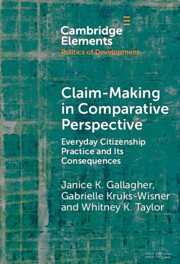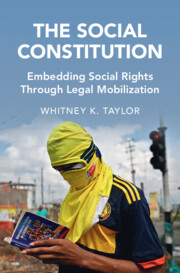Refine search
Actions for selected content:
7 results
5 - Voice
-
- Book:
- Building Social Mobility
- Published online:
- 15 September 2025
- Print publication:
- 02 October 2025, pp 115-146
-
- Chapter
- Export citation
Concretizing the Right to Water: Engaging Infrastructurally Powerful Actors in Nairobi
-
- Journal:
- African Studies Review / Volume 68 / Issue 2 / June 2025
- Published online by Cambridge University Press:
- 18 June 2025, pp. 252-272
-
- Article
-
- You have access
- Open access
- HTML
- Export citation

Claim-Making in Comparative Perspective
- Everyday Citizenship Practice and Its Consequences
-
- Published online:
- 16 February 2024
- Print publication:
- 14 March 2024
-
- Element
- Export citation
CHAPTER NINE - Partial Constitutional Embedding
-
- Book:
- The Social Constitution
- Published online:
- 15 June 2023
- Print publication:
- 29 June 2023, pp 182-211
-
- Chapter
-
- You have access
- Open access
- HTML
- Export citation
CHAPTER FOUR - Social Embedding
-
- Book:
- The Social Constitution
- Published online:
- 15 June 2023
- Print publication:
- 29 June 2023, pp 71-95
-
- Chapter
-
- You have access
- Open access
- HTML
- Export citation

The Social Constitution
- Embedding Social Rights Through Legal Mobilization
-
- Published online:
- 15 June 2023
- Print publication:
- 29 June 2023
-
- Book
-
- You have access
- Open access
- Export citation
5 - Narrative Formation in the Central Rift Valley
- from Part I - Determinants of Contentious Land Narratives
-
- Book:
- Political Violence in Kenya
- Published online:
- 14 May 2020
- Print publication:
- 28 May 2020, pp 140-170
-
- Chapter
- Export citation
